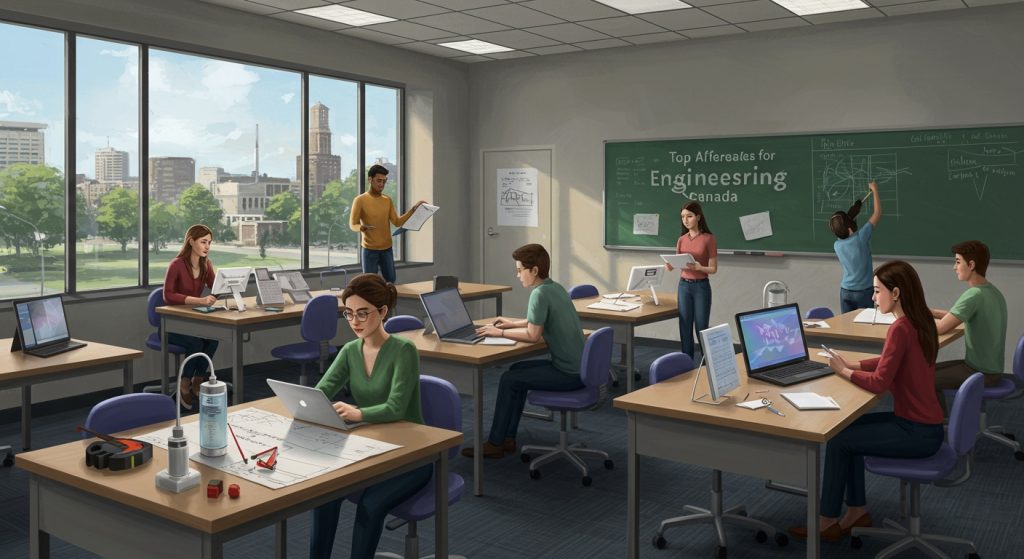Forget passively attending lectures; the real engineering edge comes from active participation. Today’s rapidly evolving fields, like AI-driven robotics and sustainable energy solutions, demand practical skills and collaborative problem-solving abilities often honed outside the classroom. Joining engineering clubs provides precisely that. Think of a student robotics team designing a drone for infrastructure inspection, leveraging computer vision and advanced materials – that’s hands-on experience you can’t get from textbooks. Moreover, these clubs are increasingly becoming talent pipelines, with companies like SpaceX and Tesla actively recruiting from competitions and projects showcased within these student organizations. Unlock exclusive university resources, network with industry professionals. Demonstrably boost your resume by diving into engineering club life; it’s more than a hobby, it’s a career accelerator.

The Undeniable Value of Engineering Clubs
Engineering clubs offer a unique blend of academic enrichment, practical experience. Professional networking that can significantly enhance your university experience and career prospects. They’re not just about attending meetings; they’re about actively participating in projects, learning from experienced professionals. Building a community with like-minded individuals. These experiences go far beyond what a textbook can offer, providing a crucial bridge between theoretical knowledge and real-world application.
Beyond the Classroom: Practical Skills Development
One of the most significant advantages of joining an engineering club is the opportunity to develop practical skills. University coursework often focuses on theoretical concepts, leaving students with limited hands-on experience. Engineering clubs fill this gap by providing opportunities to work on projects that require the application of these concepts. Consider, for instance, a robotics club. Members might be involved in designing, building. Programming robots for competitions. This hands-on experience allows them to:
- Apply principles of mechanical engineering to design robot structures.
- Utilize electrical engineering concepts to wire circuits and power systems.
- Develop software engineering skills to program robot behavior.
- Learn about sensor integration and data analysis.
These skills are highly sought after by employers, as they demonstrate a student’s ability to translate theory into practice. This is especially true in fields such as mechanical, electrical. Computer engineering, where practical experience is paramount.
Networking Opportunities: Building Connections for the Future
Engineering clubs provide unparalleled networking opportunities. They often host guest speakers from industry, organize company tours. Participate in conferences and competitions. These interactions allow students to:
- Learn about different career paths within engineering.
- Connect with potential employers.
- Gain insights into industry trends and challenges.
- Build relationships with practicing engineers.
For example, attending a presentation by a project manager from a leading construction firm can provide valuable insights into the day-to-day responsibilities of the role. Similarly, participating in a regional engineering competition can expose students to recruiters from various companies seeking talented graduates. These connections can be invaluable when it comes to securing internships and full-time job offers.
Boosting your Resume: Showcasing Your Accomplishments
Active participation in engineering clubs can significantly enhance your resume. It demonstrates your passion for engineering, your commitment to continuous learning. Your ability to work effectively in a team. When listing your involvement in engineering clubs, be sure to highlight your accomplishments and contributions:
- Describe the projects you worked on and your specific role in the team.
- Quantify your achievements whenever possible (e. G. , “Reduced energy consumption by 15% through design optimization”).
- Mention any awards or recognition you received for your work.
- Highlight any leadership positions you held within the club.
For instance, instead of simply stating “Member of the IEEE club,” you could write “Active member of the IEEE club, contributing to the design and development of a smart home automation system using Raspberry Pi and Python. Presented project at the regional IEEE conference, receiving positive feedback from industry professionals.” This level of detail provides concrete evidence of your skills and experience, making your resume stand out from the crowd.
Exploring Different Engineering Disciplines
Engineering clubs can also help you explore different engineering disciplines and identify your specific interests. Many universities offer clubs focused on specific areas of engineering, such as:
- Civil Engineering: Focuses on infrastructure design and construction.
- Mechanical Engineering: Deals with the design and manufacturing of mechanical systems.
- Electrical Engineering: Focuses on electrical systems, circuits. Electronics.
- Computer Engineering: Combines elements of electrical engineering and computer science.
- Chemical Engineering: Involves the design and operation of chemical processes.
By joining clubs related to different disciplines, you can gain exposure to various engineering fields and determine which one best aligns with your skills and passions. This can be particularly helpful for students who are undecided about their major or career path.
Leadership and Teamwork Skills: Essential for Success
Engineering clubs provide ample opportunities to develop leadership and teamwork skills, which are essential for success in any engineering career. Working on projects with other students requires effective communication, collaboration. Problem-solving skills. You’ll learn how to:
- Delegate tasks effectively.
- Resolve conflicts constructively.
- Motivate and inspire your teammates.
- Work towards a common goal.
Moreover, taking on leadership roles within the club, such as president or project manager, can further enhance your leadership abilities. These experiences will not only make you a more effective engineer but also a more valuable asset to any organization.
Real-World Applications: Case Studies and Examples
Numerous examples illustrate the tangible benefits of participating in engineering clubs. Case Study 1: Formula SAE Formula SAE is a collegiate design competition where students design, build. Race a formula-style race car. Participating in Formula SAE requires students to apply a wide range of engineering principles, from aerodynamics and chassis design to engine tuning and suspension optimization. Students involved in Formula SAE often secure internships and full-time positions with leading automotive companies, such as Ford, General Motors. Tesla. Case Study 2: Robotics Competitions Robotics competitions, such as FIRST Robotics and VEX Robotics, challenge students to design, build. Program robots to perform specific tasks. These competitions foster creativity, problem-solving skills. Teamwork. Students who excel in robotics competitions often pursue careers in robotics, automation. Artificial intelligence. Case Study 3: Environmental Engineering Projects Environmental engineering clubs often engage in projects related to sustainability, water treatment. Waste management. These projects provide students with hands-on experience in addressing real-world environmental challenges. Students involved in these projects often pursue careers in environmental consulting, government agencies. Non-profit organizations.
Comparison: Engineering Clubs vs. Independent Projects
While independent engineering projects can also provide valuable experience, engineering clubs offer several distinct advantages:
| Feature | Engineering Clubs | Independent Projects |
|---|---|---|
| Collaboration | Provides structured teamwork and mentorship opportunities | Primarily individual effort |
| Resources | Access to university resources, equipment. Faculty advisors | Limited access, often relying on personal resources |
| Networking | Opportunities to connect with industry professionals and alumni | Limited networking opportunities |
| Recognition | Projects often showcased at university events and competitions | Recognition depends on self-promotion |
| Structure | Defined goals, timelines. Support systems | Requires self-discipline and project management skills |
While independent projects can be a valuable supplement to your engineering education, engineering clubs provide a more structured and supportive environment for learning and growth.
Making the Most of Your Engineering Club Experience
To maximize the benefits of your engineering club experience, consider the following tips:
- Be proactive: Actively participate in club activities, attend meetings regularly. Volunteer for projects.
- Seek out mentorship: Connect with experienced club members and faculty advisors to gain valuable insights and guidance.
- Take on leadership roles: Volunteer for leadership positions to develop your leadership and management skills.
- Network strategically: Attend industry events and connect with professionals in your field of interest.
- Document your achievements: Keep a record of your projects, accomplishments. Contributions to the club.
By following these tips, you can transform your engineering club experience into a valuable asset that will enhance your university experience and boost your career prospects.
Conclusion
Engineering clubs are more than just extracurriculars; they are launchpads for your future. Remember, actively participating, not just attending, is key. I personally landed my first internship after showcasing a project I developed in the robotics club – a simple line-following robot. It demonstrated initiative and practical skills. Don’t underestimate the power of networking either. Many companies now actively scout for talent within these clubs, recognizing the value of hands-on experience and collaborative problem-solving, especially with the increasing industry focus on automation and AI-driven solutions [https://www. Engineerjobs. Com/]. Therefore, step up, take on leadership roles, contribute to projects. Actively engage with industry professionals who often visit these clubs. Your university years are a golden opportunity to build a strong foundation. Embrace the challenge, leverage the resources. Engineer your success, one club meeting at a time.
More Articles
Top Engineering Universities in Germany: Your 2025 Degree Guide
Biotech Careers in 2025: Exploring Paths, Skills. Future Opportunities
Navigating German University Applications: A Simple Step-by-Step Guide
Navigating UK University Applications: A Step-by-Step Guide for International Students
FAQs
So, what exactly is an engineering club, anyway?
Think of it like this: it’s a student-run organization focused on a specific area of engineering, or even just engineering in general. It’s a place where you can meet like-minded folks, work on cool projects. Learn skills they don’t always teach you in class. , it’s engineering outside the lecture hall!
Why should I even bother joining an engineering club? I’m already drowning in coursework!
I hear you! But trust me, it’s an investment. Clubs give you practical experience, boost your resume. Help you network. Plus, it’s a great way to de-stress and connect with people who get what you’re going through. Think of it as a study break that actually benefits your future.
What kind of engineering clubs are usually out there?
It really depends on your university. You’ll often find clubs based on specific disciplines like robotics, civil engineering, aerospace, or computer science. Some are even focused on things like sustainability or engineering for social good. Explore your options – you might be surprised!
Okay, I’m intrigued. How does being in a club actually help my career?
Great question! Employers love to see that you’ve gone beyond the classroom. Clubs show initiative, teamwork. Problem-solving skills. Plus, you often get opportunities to attend conferences, workshops. Even competitions, which are fantastic resume builders. And networking within the club can lead to internships or even job offers down the line.
Is it a huge time commitment? I’m worried I won’t have enough time.
That’s a valid concern! Most clubs interpret that students are busy. The time commitment varies depending on the club and your involvement. You can usually choose how much you want to participate. Start small and see how it fits into your schedule. Even a few hours a week can make a big difference.
I don’t have any experience in [insert specific engineering field]. Can I still join a club?
Absolutely! Most clubs welcome students of all skill levels. They often have workshops and training sessions to help you learn the ropes. Don’t be afraid to join even if you feel like a newbie – it’s a great way to learn and grow.
How do I actually find and join an engineering club at my university?
Your university’s website or student affairs office is a good place to start. They usually have a directory of student organizations. You can also check bulletin boards around campus or ask your professors. Many clubs also have social media pages, so give them a search! And don’t be shy about attending an introductory meeting to see if it’s a good fit.



